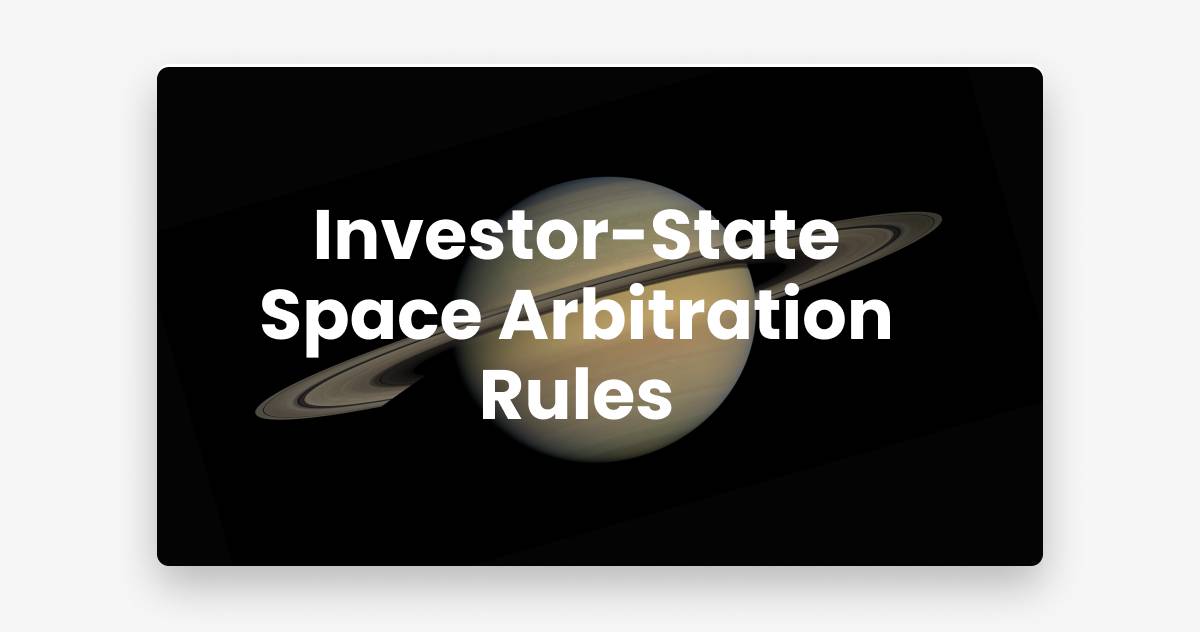
As foreshadowed in previous blog posts here and here, the development of international space law has not entirely kept pace with the increasing commercialization and privatization of outer space activities. As a result, several stakeholders in the space sector have called for a specialized arbitral institution to address the lack of recourse for private entities.
According to a recent survey of space arbitrations presented at the International Astronautical Congress, most commercial arbitrations in the space sector were administered under the ICC Rules, the ICDR Rules or the LCIA Rules. But no such data is available for investor-State claims. The survey concludes that while existing international arbitration infrastructure appears to be adequate, “there exists an opportunity for players in the arbitration market […] to develop a reputation for comparative expertise in space-related dispute resolution”.
In this piece, we look at the existing options for space actors to pursue sector-specific investment treaty claims, including under the PCA Optional Rules for Arbitration of Disputes Relating to Outer Space Activities (the “PCA Outer Space Rules”). We briefly examine the broad arguments in favor of and against the need for a specialised institution for space cases and its implications for the space sector.
The Current Landscape
Apart from urging their home States to use mechanisms for inter-State dispute settlement such as the International Court of Justice or the Claims Commission under the Liability Convention, there are scant opportunities for private space actors to pursue claims either against States or private parties with which they lack a contractual relationship. Whilst industry-specific dispute resolution mechanisms exist (including the International Telecommunications Satellite Organisation Agreement, the European Telecommunications Satellite Organisation Convention, the International Mobile Satellite Organisation Convention, and the Constitution of the International Telecommunications Union), these apply only at the inter-governmental level. Over the last few decades, however, several arbitral institutions have stepped in to fill this gap.
International Court of Air and Space Arbitration (ICASA)
The ICASA was set up by the Société Française de Droit Aérien et Spatial in 1994 and is in Paris. The ICASA Rules provide that any proceedings thereunder would be subject to “absolute secrecy”. As a result, no case information is publicly available. Although institutions like the Shanghai International Aviation Court of Arbitration and the Hague Court of Arbitration for Aviation support aviation arbitrations, it appears that the ICASA is the first (and only) arbitral institution specifically designed to administer space disputes.
Draft Convention on the Settlement of Space Law Disputes
In 1998, the Space Law Committee of the International Law Association adopted the final draft of the Draft Convention on the Settlement of Space Law Disputes (the “Draft Convention”). The Draft Convention provided for three options for dispute settlement: (a) the International Court of Justice; (b) an International Tribunal for Space Law to be created by the Draft Convention; or (c) an arbitral tribunal. Notably, both States and private parties could initiate claims under the Draft Convention.
However, there was no consensus between States for the Draft Convention to be adopted into a binding treaty and resultingly, the International Tribunal for Space Law was never set up. In any case, there are several provisions of the Draft Convention that are out of step with contemporary arbitral practice such as lack of annulment provisions. Even though the Draft Convention has not been adopted by countries as a treaty, it provides useful background into the structure and function of any future institution administering investor-State space cases.
PCA Outer Space Rules
The PCA Outer Space Rules 2011 were formulated by the Permanent Court of Arbitration as industry-tailored rules that may apply to disputes between States as well as private actors. The PCA Outer Space Rules are based on the 2010 UNCITRAL Arbitration Rules and reflect “the particular characteristics of disputes having an outer space component involving the use of outer space by States, international organizations and private entities”. For instance, the PCA Outer Space Rules provide for an automatic waiver of sovereign or other immunity considering that inter-governmental and State actors may be party to arbitral proceedings. It also provides for a specialized panel of arbitrators (including lawyers and non-lawyers) and scientific and technical experts.
Recognizing the technical nature of the space industry, the PCA Outer Space Rules specifically empowers the arbitral tribunal to request “a non-technical document summarizing and explaining the background to any scientific, technical or other specialized information” from the parties and to appoint a “confidentiality adviser” to review the confidentiality of any information provided by the parties. Notably, the PCA Outer Space Rules may be used by parties for an investor-State proceeding as well.
Although there are no publicly available arbitrations under the PCA Outer Space Rules, the PCA noted that the “feedback they had received on the Rules was overall very positive”. Importantly, the PCA Outer Space Rules provide a framework for any future arbitral institutions including the degree to which any procedural rules would need to be tailored to fit the needs of the space industry.
DIFC Courts of Space
The latest specialized dispute resolution body in outer space is the DIFC Courts of Space. The Courts of Space is a collaboration between the Dubai International Financial Centre Courts and the Dubai Future Foundation. It launched a Space Disputes Guide detailing the types of space disputes that can be brought before it and maps some broad dispute scenarios and the applicable procedure.
Specialized Arbitral Institution for Investor-State Space Arbitration
Proponents of the need for an institution administering outer space disputes often cite the lack of specialized knowledge and expertise in existing dispute settlement mechanisms to support the space industry. Indeed, there have been various calls to establish an arbitral institution on the lines of the ICSID to administer investor-State space cases and an International Court of Air and Space Law. Whether States will be able to gather consensus at a multilateral level remains to be seen. However, recent attempts on a bilateral or plurilateral basis such as the Artemis Accords might be used as a template for approaching the establishment of any such specialized institution.
On the other hand, while specialized arbitral institutions could be helpful, the adaptability of current procedural rules cannot be ignored and is a more straight-forward platform for the resolution of international commercial space disputes, at least in the near term. Given the track record of leading arbitral institutions such as the ICC, LCIA, ICDR, and SIAC (among others) at effectively administering arbitrations in multiple sectors including highly technical ones such as finance and technology, there is no reason that these institutions cannot meet the needs of the space industry, as many examples of space-related cases under traditional arbitration rules have shown.
In the case of investor-State disputes, as most investment treaties provide for ICSID or UNCITRAL arbitration (newer treaties include institutional arbitration as well), the utility of a new arbitral institution is questionable. Even if the need for a specialized institution is perceived by some as the number of space disputes grow, there will be a need for a broad-based survey of space actors before any such action is taken. Apart from developing a specialized institution like the ICSID for investor-State space cases, which seems unlikely in the near term, States would also need to examine their investment treaties to ensure that any such institution is suitably referenced in the relevant investor-State arbitration clause.
For those interested to explore this topic further, the Space Arbitration Association held a panel discussion on “Is There a Need for an Institution Specialized in Space Disputes?” on Thursday, 10 February 2022. You can view the panel discussion online here and read the conference report here.
You might also like
Investment Protection and Space Investors
Investment Protection and Space Investors By Luca Erhart and Riccardo LoschiInvestment Protection...
A close win for non-binding instruments in space law
A close win for non-binding instruments in space law By Ruvimbo Samanga"A close win for...
Space Arbitration: Protecting Space Investments
Space Arbitration: Protecting Space Investments By Katie MakSpace Arbitration: Protecting Space...


